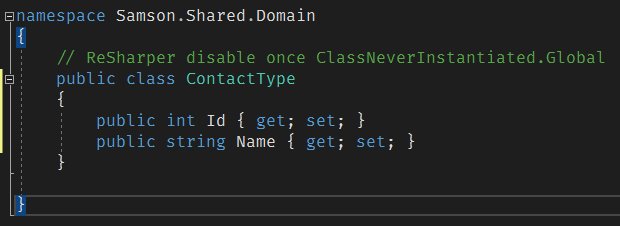ORA-00918: column ambiguously defined
See original GitHub issueUsing Oracle 12C 12.1.0 with latest EF Core 3.1 provider
I am mapping to an existing user/schema/database (: and are not in charge of it.
I have a contact person that have a contact type. I only have navigation to the ContactType
When I run this code
var contact = context.Contacts.Include(x=>x.Type).FirstOrDefault();
That produces this sql:
fail: Microsoft.EntityFrameworkCore.Database.Command[20102]
Failed executing DbCommand (67ms) [Parameters=[], CommandType='Text', CommandTimeout='0']
SELECT "c"."ID", "c"."TYPE", "c"."CUSTOMER", "c"."EMAIL", "c"."NAME", "c"."PHONE", "c0"."ID", "c0"."NAME"
FROM "SAMSON"."CUSTOMER_CONTACT" "c"
INNER JOIN "SAMSON"."CUSTOMER_CONTACT_TYPE" "c0" ON "c"."TYPE" = "c0"."ID"
FETCH FIRST 1 ROWS ONLY
I have no problems running the sql: Is it an error, or are my relation mapping wrong?
SELECT "c"."ID", "c"."TYPE", "c"."CUSTOMER", "c"."EMAIL", "c"."NAME", "c"."PHONE", "c0"."ID", "c0"."NAME"
FROM "SAMSON"."CUSTOMER_CONTACT" "c"
INNER JOIN "SAMSON"."CUSTOMER_CONTACT_TYPE" "c0" ON "c"."TYPE" = "c0"."ID";





Issue Analytics
- State:
- Created 3 years ago
- Comments:15 (4 by maintainers)
 Top Results From Across the Web
Top Results From Across the Web
ORA-00918: column ambiguously defined tips
ORA-00918 column ambiguously defined. Cause: A column name used in a join exists in more than one table and is thus referenced ambiguously....
Read more >ORA-00918: column ambiguously defined
The source of an ORA-00918 error comes from a mistake when attempting to join two or more tables that share the same name...
Read more >ORA-00918: column ambiguously defined in SELECT
The solution is quite simple: you will have to expand the projection to explicitly select named columns. Then you can either leave out...
Read more >Oracle / PLSQL: ORA-00918 Error Message
Cause. You tried to execute a SQL statement that joined two or more tables, where a column with the same name exists in...
Read more >Ora 00918 Column Ambiguously Defined: Solved Efficiently
Ora 00918 column ambiguously defined means that your Oracle database is unable to determine which table a column belongs to because you specified...
Read more > Top Related Medium Post
Top Related Medium Post
No results found
 Top Related StackOverflow Question
Top Related StackOverflow Question
No results found
 Troubleshoot Live Code
Troubleshoot Live Code
Lightrun enables developers to add logs, metrics and snapshots to live code - no restarts or redeploys required.
Start Free Top Related Reddit Thread
Top Related Reddit Thread
No results found
 Top Related Hackernoon Post
Top Related Hackernoon Post
No results found
 Top Related Tweet
Top Related Tweet
No results found
 Top Related Dev.to Post
Top Related Dev.to Post
No results found
 Top Related Hashnode Post
Top Related Hashnode Post
No results found

@Martin-Andersen Yes, the bug does not occur in DB 12.2 and higher as it does in DB 12.1. I was assured by the SQL dev team the recommended solution is to upgrade to 12.2 or higher if aliases can’t be used.
@Martin-Andersen There aren’t really any good solutions.
EF Core doesn’t have a way for providers to retrieve the DB server version. Thus, if ODP.NET EF Core generates aliases, it would have to make this change for all DB versions, not just 12.1. Now, I’m not sure if aliases can be used in this way in LINQ. I’ll find out.
The SQL generated is actually correct. DB 12.1 has a known, documented issue.
If the select list contains columns with identical names and you specify the row_limiting_clause, then an ORA-00918 error occurs. This error occurs whether the identically named columns are in the same table or in different tables. You can work around this issue by specifying unique column aliases for the identically named columns.This issue was fixed in 12.2, but was not backported to 12.1. Essentially, the “patch” is to move to DB 12.2 or higher.